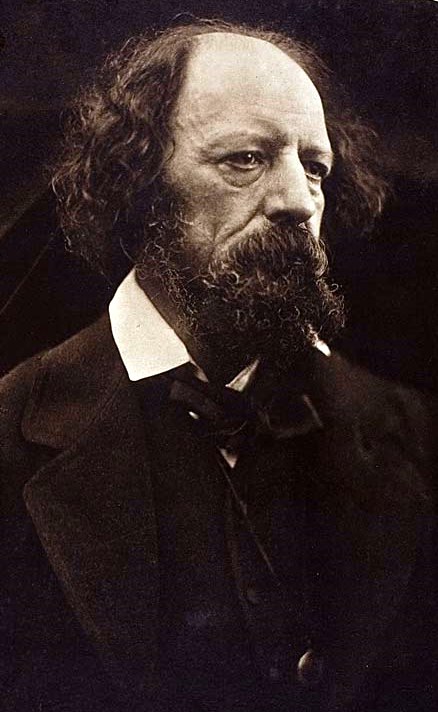“La voce dei morti era per me una voce vivente.”
Origine: Citato in Harry Carmichael, epigrafe a Delitto al rallentatore, Il giallo Mondadori, n. 1160, 25-4-1971.
Alfred Tennyson, primo Barone Tennyson , fu un poeta inglese, laureato del Regno Unito, nonché uno dei più famosi del suo Paese.
La maggior parte dei suoi versi furono ispirati a temi classici o mitologici, anche se la celebre In Memoriam fu scritta per commemorare il suo migliore amico Arthur Hallam, anch'egli poeta e suo compagno di corso al Trinity College di Cambridge, che si era fidanzato con sua sorella ma era improvvisamente morto nel 1833 a causa di un'emorragia cerebrale.
Una delle opere più famose di Tennyson sono gli Idilli del re , una raccolta di poesie interamente basate su Re Artù e sul ciclo brettone, tema ispiratogli dai racconti che Sir Thomas Malory aveva precedentemente scritto sul leggendario sovrano. L'opera fu dedicata al Principe Alberto, marito della regina Vittoria. Nel corso della sua carriera Lord Tennyson si cimentò anche nella composizione di drammi teatrali, ma in questo campo i suoi lavori riscossero uno scarso successo.

“La voce dei morti era per me una voce vivente.”
Origine: Citato in Harry Carmichael, epigrafe a Delitto al rallentatore, Il giallo Mondadori, n. 1160, 25-4-1971.
“Non ha amici l'uomo che non si è fatto mai dei nemici.”
Origine: Citato in Guido Almansi, Il filosofo portatile, TEA, Milano, 1991.
"Merlin and the Gleam", st. 3 (1889)
Letter to Emily Sellwood, quoted in Alfred Lord Tennyson: A Memoir by His Son, by Hallam T. Tennyson (1897)
“Nor is he the wisest man who never proved himself a fool.”
Stanza 124
Locksley Hall Sixty Years After (1886)
Act iv, scene 3
Queen Mary: A Drama (published 1876)
“Be patient. Our Playwright may show
In some fifth act what this wild Drama means.”
The Play, reported in Bartlett's Familiar Quotations, 10th ed. (1919)
The First Quarrel, stanza VI., lines 3-4; reported in Bartlett's Familiar Quotations, 10th ed. (1919)
Part I, section xxii, stanza 1
Maud; A Monodrama (1855)
“Her manners had not that repose
Which stamps the caste of Vere de Vere.”
Stanza 5
Lady Clara Vere de Vere (1832)
“In statesmanship
To strike too soon is oft to miss the blow.”
Act iii, scene 6
Queen Mary: A Drama (published 1876)
“The night with sudden odour reeled;
The southern stars a music pealed.”
The Rosebud, reported in Bartlett's Familiar Quotations, 10th ed. (1919)
“…none can truly write his single day,
And none can write it for him upon earth.”
Unpublished Sonnet (originally written as a preface to Becket), in Alfred Lord Tennyson: A Memoir by His Son, by Hallam T. Tennyson (1897)
“And ah for a man to arise in me,
That the man I am may cease to be!”
Part I, section x, stanza 6
Maud; A Monodrama (1855)
Act I, Scene III
The Foresters, Robin Hood and Maid Marion (1892)
“The song that nerves a nation's heart
Is in itself a deed.”
Epilogue to The Charge of the Heavy Brigade, reported in Bartlett's Familiar Quotations, 10th ed. (1919)
" The Grandmother http://www.poetryconnection.net/poets/Alfred_Lord_Tennyson/14415", st. 8 (1864)
“That jewelled mass of millinery,
That oiled and curled Assyrian Bull.”
Part I, section vi, stanza 6
Maud; A Monodrama (1855)
“Insipid as the queen upon a card.”
Aylmer's Field (1864); reported in Bartlett's Familiar Quotations, 10th ed. (1919)
" Sea Dreams http://www.poetryconnection.net/poets/Alfred_Lord_Tennyson/14402" (1864) l. 301-303
“Authority forgets a dying king,
Laid widow’d of the power in his eye
That bow’d the will.”
Origine: Morte D'Arthur (1842), Lines 121-123
Origine: Locksley Hall Sixty Years After (1886), Line 131
Origine: Locksley Hall Sixty Years After (1886), Line 275
"The Vision of Sin", sec. 5 (1842)